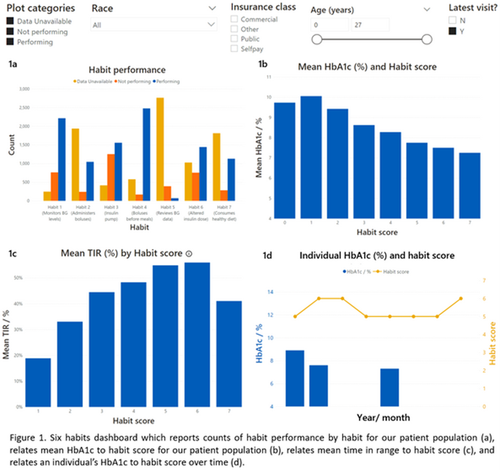Abstract: Preparing for Risk-based Management of Type 1 Diabetes (T1D): Integrating Biomarkers of Performing Diabetes Self-management Habits into a Population Health Dashboard
C. Vandervelden1, B. Lockee1, S. Carrothers1, S.R. Patton2, R. McDonough1, J.M. Lee3,4, M. Clements1
1Children's Mercy Hospital, Endocrinology, Kansas City, United States, 2Nemours Children's Health, Center for Healthcare Delivery Science, Jacksonville, United States, 3University of Michigan, Pediatric Endocrinology, Ann Arbor, United States, 4University of Michigan, Susan B. Meister Child Health Evaluation and Research Center (CHEAR), Ann Arbor, United States
Introduction: Recent publication of the six pediatric type 1 diabetes (T1D) self-management habits [J. M. Lee et al., JAMA Netw Open. 2021; 4(10)], aka “the 6 habits”, offers a new evidence-based measure for a population health dashboard.
Objectives: To create an interactive population health management tool that displays data related to “the 6 habits” for providers, and to propose new habits, which align with the seven pillars of diabetes self-management.
Methods: Diabetes device data and electronic medical records for 4293 youth ages 1–26 with T1D from a pediatric diabetes care network in the Midwest USA were imported into a novel Microsoft Azure-based data warehouse developed by our team (the “D-Data Dock”). We designed population health dashboards in Power BI to display performance of “the 6 habits” plus a 7th habit (“consumes a healthy diet”) by youth and their relationship to HbA1c% and time in range (TIR). Providers can examine habit performance in the population by various demographics (race, age, insurance class, etc.), and at the individual patient level in real-time through electronic health record interface.
Results: Provider documentation of habit performance and habit performance by individual varied significantly by habit (Figure 1a). Higher habit scores (the total number of habits performed) were associated with stepwise improvements in both HbA1c% and TIR (1b and 1c). Performance of a 7th (healthy eating) habit was associated with further reduction in HbA1c% (1b). We prototyped a dashboard displaying changes to an individual's habit score and HbA1c% longitudinally (1d).

Conclusions: We have validated “the 6 habits” as a composite biomarker of engagement in T1D self-management and identified a 7th habit that associates with glycemic control. Future research should examine whether tracking these habits can aid providers when selecting interventions to improve glycemic control among youth.
Link: https://onlinelibrary.wiley.com/doi/10.1111/pedi.13400
